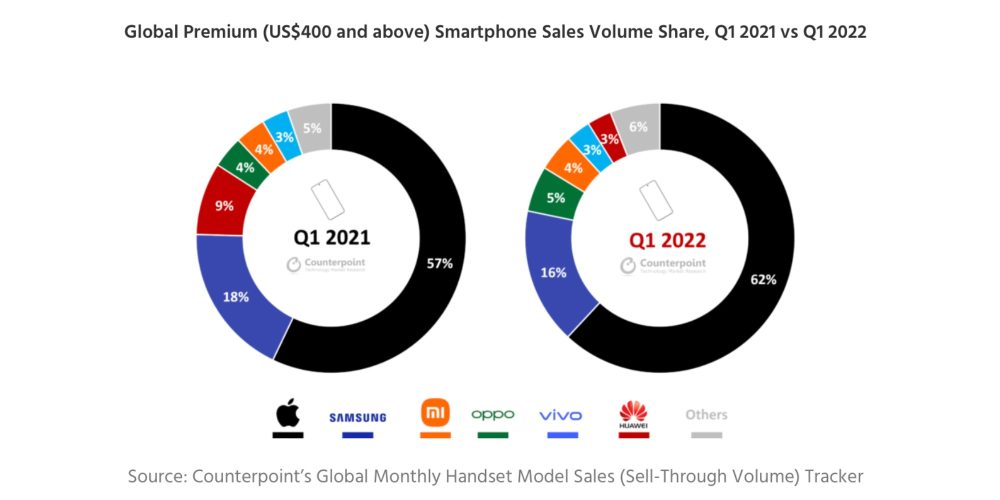
After Counterpoint Research revealed that the iPhone 13 continues to dominate as the global best-selling smartphone in April, the company has now shared new data that shows that Apple takes 62% of the premium market in the first quarter of 2022.
The study reveals that Apple reached its highest first-quarter share in the premium segment since Q1 2017. In addition, even with the global premium smartphone market sales volume declining 8% YoY during the quarter, it has still performed better than the overall smartphone market, which declined by 10%.
With the eighth consecutive quarter in which the premium market has outperformed overall smartphone market growth, Apple continues to lead it. This time, Counterpoint Research shows that this 60% share was driven by the iPhone 13 series, which has been the best-selling model globally each month since October 2021.
The volume growth in the ultra-premium segment was driven by Apple and Samsung. The iPhone 13 Pro Max and the iPhone 13 Pro together captured over two-thirds of sales volume within the ultra-premium price segment. This was driven by strong volume growth in the US, China, and Western Europe. In China, the sales in the >US$1000 price segment grew 176% YoY in Q1 2022. The segment alone captured over one-fifth of China’s smartphone market value during the quarter. Apple emerged as the biggest winner from Huawei’s decline in the premium market. The premium market in China still holds potential, and will be driven by upgrades, especially by users from Huawei’s large installed base.
While Samsung was the second-best in the premium segment, its share has declined due to the delayed launch of the Galaxy S22 series compared to the S21 series launch in 2021. Counterpoint Research says that “the Galaxy S22 Ultra has been a hit combining the best of the S series and the Note series.”

As you can see in the charts above, Apple jumped from 57% in Q1 2021 to 62% in Q1 2022 thanks to the iPhone 13. Samsung, on the other hand, went from 18% last year to 16% in 2022. Huawei also saw a large decline from 9% to 3% in just a year.
The current generation of Apple smartphones, the iPhone 13 series brought a smaller notch for the first time since the iPhone X introduction, alongside battery and camera improvements. Apple has also pushed a new color for both regular and Pro models by the beginning of the year to boost sales.
Three months from now, the company is expected to introduce the iPhone 14, which you can learn more about it here.
Author: José Adorno
Source: 9TO5Google



